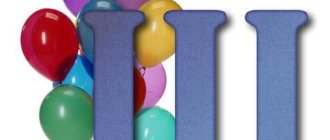Article on the topic
Treat or endure? 10 rules for dealing with hyperactive children
An employee of the Institute of Correctional Pedagogy of the Russian Academy of Education, candidate of pedagogical sciences Valentina Kisileva, tells the story
- Look, there are detectives hanging on the tree. ...Mishka and I just rolled around. The girl is five years old, getting married soon! And she is “detective”... - I said detective correctly! It’s my tooth that has fallen out and is whistling... - I’ve lost three, but I still speak correctly! Listen here: giggles! ...Looking at them, I laughed so much that I even got hungry... No detective work. No naked, but briefly and clear: Fyfki!
V. Dragunsky “The Enchanted Letter”»
It is allowed to burr
Children are allowed to pronounce sounds incorrectly until they are 4.5–5 years old, say speech therapists. Moreover, at this age they have every right to distort words. They are still developing the sound structure of their speech, and children seem to be trying out different options for sound pronunciation.
A child may not pronounce hissing sounds correctly, he may not have the sound “r” or a hard “l”... By the age of 4–5 years, pronunciation usually corrects itself and most children do not need the help of a speech therapist.
In fact, the inability to clearly pronounce the notorious “r” or “sh” is not the biggest problem in life. And speech therapists sometimes express a seditious thought: well, let him not reprimand... Unless you predict a career for your child as a politician or actor and the “smile” is not caused by a speech pathology.
The older the child, the more difficult it is to correct his pronunciation, and after 14 years old this becomes almost impossible. So, if you didn’t catch it in time, it will be difficult for you to achieve perfect speech from a teenager.
But sometimes (and, by the way, more and more often lately) the inability to speak correctly is caused in a child by a speech pathology. And here poor diction will result in difficulties in writing and reading, and, therefore, problems at school. If you have exactly this case, you cannot do without the help of a speech therapist.
That morning I quickly completed my lessons because they were not difficult. ...I composed a sentence: “We built a salash.” And nothing more was asked.
V. Dragunsky “Grandmaster’s Hat”
How to speed up the correction process
To successfully correct speech defects, you will need not only the help of experienced speech therapists, but also, possibly, a visit to a child psychologist. But even with all the involvement of highly professional specialists, the role of parents is very important. Compliance with certain rules by parents will help the child quickly overcome the difficulties that arise:
- doing homework regularly;
- regular attendance at speech therapy lessons;
- responsible implementation of the speech therapist’s instructions;
- compliance with doctor's recommendations, including drug treatment;
- controlling the child's speech.
It should be remembered that children learn information that they find interesting and perform tasks that they enjoy doing. Therefore, do not turn speech therapy classes into a boring learning process, introduce an element of play and participate in them with sincere interest.
Sofia Rogozinskaya
Don't lose your vowels!
Parents should be wary and suspect that not everything is in order with your child’s speech in the event of such errors.
The baby interchanges sounds. It’s one thing if instead of the word “hat” he says “sapka” - this is just an inability to pronounce the sound “sh”. And it’s completely different if he not only says “boot” instead of “hat,” but also “shobaka” instead of “dog.” This means that he does not hear, does not distinguish between the sounds “s” and “sh”, and therefore replaces them.
Such errors do not correct themselves. Therefore, do not wait for the baby to grow up, and even if he is 2 years old and has just started talking, take him to a speech therapist.
The child swallows syllables or, conversely, adds extra ones. And at 3, and even at 4 years old, he is allowed to distort words almost beyond recognition, but even in the “author’s version” the word must consist of the correct number of syllables.
The same “hat” can be “shaka”, “sapa”, “paka”, but not “shap” or “shapaka”.
Children can omit or add consonants, but not vowels. After all, vowels are the basis of a word, its rhythm. And violation of syllable structures is a signal that the child does not hear the rhythm of the word. Although with normal development this function is formed at two to three years of age.
The child is over 3.5 years old, but he speaks sluggishly, as if chewing words. And in this case, you will have to contact a speech therapist for special exercises.
Just like if he speaks through his nose. This “pronunciation” is not always associated with enlarged adenoids. Place a spoon or mirror to your child's nose and have him say something. The mirror may fog up slightly from breathing, but if it fogs up a lot, it means that a stream of air is coming through the mouth, and our speech involves nasal breathing.
And today our cat gave birth to kittens yesterday...
S. Mikhalkov “What do you have?”
What are the causes of speech impairment
Speech is one of the most important mental functions of a person, necessary for successful socialization and communication with other people. When assessing the general psychophysical development of a child, pediatricians always pay attention to the level of speech development.
For normal speech development in a child, the following is necessary:
- normal functioning of the central nervous system (CNS);
- no hearing impairment;
- normal vision;
- sufficient active verbal communication with the child from adults, especially in the family.
If we talk about the ability to correctly pronounce sounds, it is necessary to remember about the development of the child’s speech apparatus itself. The speech apparatus includes: lips, teeth, tongue (the correct length of the frenulum), small tongue, hard palate, nasal cavity, epiglottis and the larynx itself with vocal cords, trachea, bronchi and lungs (after all, the source of sound production is mostly a stream of air). Therefore, it is not surprising, for example, that with a respiratory disease, the timbre of the voice and the ability to pronounce sounds change, up to the complete absence of the voice. A dental problem can make it difficult to understand even the speech of an adult.
Having understood the necessary conditions for the formation of correct speech, speaking about speech disorders, we can identify the reasons for their formation.
- Congenital (cerebral palsy, abnormal development of the nervous system due to intrauterine infections, hypoxia) and acquired disorders of the central nervous system (infections, injuries).
- Hearing impairments – again, both congenital (due to impaired formation of the hearing organ or the functioning of the central nervous system) and acquired (infections, injuries).
- Visual impairments - by analogy with the organ of hearing - are congenital and acquired.
- Anatomical or physiological dysfunction of the organs of the speech apparatus. There can be many reasons - from a short frenulum of the tongue, which limits its movement, to disturbances in the activity of the nervous system, causing tension in the muscles of the maxillofacial area.
- Insufficient communication with the child in the family, speech therapy problems in adult family members.
Having understood the causes of speech defects, we see that in the presence of physical pathologies, parents cannot qualitatively influence the recovery processes, except for carefully following doctors’ orders.
But if we are talking about speech disorders associated with communication problems in the family, then the aggravation of these speech problems can be avoided by establishing a psychological climate in the family and sufficient communication with the child. In such situations, such children and their parents will be advised to consult a psychologist.
Who has the vocabulary?
The speech therapist not only “produces” sounds, he checks the child’s overall development, looks at what kind of vocabulary the child has, whether he has good auditory and visual memory... Does he know how to correctly construct sentences, modify words, use prepositions...
By the age of 6, a child should know all the variety of household items: dishes, furniture, clothes... Unfortunately, today, almost a first-grader may hear words like “colander” or “sarafan” for the first time from a speech therapist. It’s good when there is a grandmother in the family who reads fairy tales and switches from an action movie to a domestic cartoon. But even overly busy dads and moms can find moments to talk with their baby. Just while you are cooking borscht, changing a tire on your car, working on the computer, explain to him what you are doing.
If new words are difficult to remember, if the child is not able to learn a single poem, this is also a reason to contact a speech therapist.
Three years is the age of why. But children who do not remember well are little interested in what is happening around them, rarely ask questions and usually immediately forget the answers. A child's lack of curiosity is an alarming symptom. Speech pathology is closely related to neurological problems, and poor memory can be caused not by developmental features, but by neurological diseases that arose due to a complicated mother's pregnancy or difficult childbirth.
By the age of 5, a child should be able to correctly agree words in gender and number, and by the age of 6, in case. He must be able to form and modify words, make sentences, use prepositions correctly and not confuse them.
Before going to school, you need to clearly know where “right” is, where “left” is, what “yesterday” is and what “tomorrow” is. Ignorance of such things indicates that the child has impaired visual and temporal perception.
So, in fact, all children benefit from visiting a speech therapist before going to school. A specialist will look at whether your child’s development is appropriate for his age and will tell you what you need to pay attention to and how you and your baby should deal with it before school.
What parents can do besides contacting a speech therapist
In the early stages of stuttering, parents should do whatever is necessary to create a calmer environment in which they can express themselves without anxiety. Doctors still don't have a clear answer about why children stutter, but there are things parents can do to ease the problem. Here are three ways:
- Reduce stress. Although it is unclear why children stutter, it is known that emotional stress is significantly associated with stuttering, as is a family history of the disorder. Avoid putting pressure on your little one to speed up their language skills or correct their deficiencies.
- Read as much as possible. The best way to help develop language skills is to read fairy tales, stories and rhymes that are clear and easy to understand. Research shows that children who are read to regularly can develop meaningful language—saying their first real words—earlier and more effectively. Be sure to point to a picture in the book—a car, a ball, or a dog—and say those words clearly.
- Have lunch with the whole family. Research shows that in families that eat meals together, children have better oral skills. Perhaps through regular participation in conversation with adults, they will learn many new words and correct ways to form sentences.
Speech training games
Those who have dexterous, sensitive fingers have well-developed speech. The following games will help develop fine motor skills:
► Pour peas into one box and beans into another, place them on opposite sides of the child and invite him to simultaneously put the cereal into a common pan. By the age of 3–4 years, a normally developing child’s actions should be coordinated.
► Hide a small toy in a pot of cereal - let the child dig through the cereal, looking for a car or a baby doll and thus developing tactile sensations. Or you can put the toy in a bag so that the baby can guess by touch what mom hid there.
This is how we train visual memory.
► Draw a picture for your child with lots of details. A house with windows, one has a curtain, the other does not. To the right of the house there are spruce trees, to the left there are apple trees. Smoke is coming from the chimney. In the left corner there is the sun, in the right corner there are birds... Let him redraw this picture exactly. It is not so important how well everything is drawn, it is important how accurately. If the child switched the trees or did not see the curtains, it means that he does not notice the details and his visual perception is impaired.
Now let's train our auditory memory.
► Can your child distinguish everyday noises? Try to see if he can, without looking, by hearing, determine what sound is being made: a running mixer, a closing refrigerator door, a match striking a box...
And for the child to relate himself in space...
► Constantly check with him: what is behind you, what is to your left, what is above you... What if you turn in the other direction?
Don't expect instant results. You will have to do these exercises dozens of times before your speech improves.
Bilingual children (bilinguals)
Many children nowadays grow up learning two languages. Mixing vocabulary from two languages, making more grammatical errors and having a relatively small vocabulary in speech are all common behaviors in children in the early stages of learning two languages simultaneously.
However, deficiencies usually disappear over time on their own. These normal characteristics are sometimes mistaken by pediatricians for speech delays. So make sure your pediatrician knows that your bilingual child is learning two languages at once if you are referred to a speech-language pathologist.
Speech therapist - who is he and why is he needed?
A speech therapist is a specialist who deals with the elimination and correction of speech disorders in children. With its help, you can correctly “place” sounds, eliminate stuttering and other defects in the spoken genre.
In addition, going to a speech therapist opens up a lot of additional opportunities in terms of the child’s development: physical formation of the speech apparatus, concentration of visual and auditory attention, checking the appropriateness of the baby’s age and his intellectual development. Diagnostics and training take place in the form of games, which, without a doubt, will appeal to the child.
Classes with a speech therapist will help the child formulate his thoughts correctly and quickly. This provides greater opportunities for understanding the surrounding reality and communicating with peers. It is recommended to consult a speech therapist if you have the following disorders:
- phonemic – disturbances in the pronunciation of a sound or group of sounds;
- general underdevelopment of speech – violations of sound pronunciation, vocabulary deficit;
- phonetic-phonemic - violation of sound pronunciation and replacement of some sounds with others;
- stuttering – involuntary repetition of syllables and letters, forced stops during speech.
Where does a speech therapist work? Is a flexible schedule possible?
Speech therapists work in educational and medical institutions. A speech therapist in education is called a teacher-speech therapist, in medicine - simply a speech therapist.
Speech therapists in medicine work in clinics and departments for people with speech pathologies, with consequences of stroke, in maxillofacial surgery clinics, etc. They conduct appointments in clinics, work in orphanages, etc.
The salaries of speech therapist teachers in some kindergartens, mass and correctional schools are still maintained. And also in commercial development centers. A free schedule is possible if the speech therapist works exclusively privately. The salary of a speech therapist is 20 hours per week. Some speech therapists work in two places at once: in the morning in one place, and in the afternoon in another. If desired, you can combine work in an institution with private practice. Usually these are classes with wards at home, which, let me tell you, is quite difficult.
The main tasks of a speech therapist:
- study of speech defects and the causes that gave rise to them;
- development of methods and programs necessary to correct speech disorders;
- support in the development of language (languages);
- programs for the development and maintenance of languages
What should parents be concerned about?
The help of a professional speech therapist is necessary if your child:
- by two to three months it is no longer humming;
- by six to seven months no longer babbles;
- by the first year he does not utter words;
- by two years of age does not form short phrases of 2-3 words;
- by the age of three, does not make sentences of 5 or more words, does not remember short poems;
- By the age of four, he cannot formulate sentences correctly and does not ask hundreds of questions a day!
- By the age of five, he cannot speak in whole complex sentences, does not remember poems, fairy tales, or invent his own stories.
At the age of 3, it is recommended that all children undergo a consultation with a speech therapist, regardless of whether they have speech disorders or not.
Error!
Sometimes parents are sure that their child is developing normally, he is just lazy or stubborn, and does not want to talk or read. What adults perceive as stubbornness or laziness may turn out to be the beginning of serious disturbances in mental and mental development. This will definitely be noticed by a professional speech therapist, who can refer you to a neurologist or psychologist for consultation.
Note!
Often children who have speech impediments also eat poorly. It is difficult for them to eat hard vegetables or fruits, such as carrots or apples, or chew a piece of meat. Weak muscles of the upper and lower jaw not only make it difficult to absorb food, but also prevent the development of the articulatory apparatus. Speech therapist's advice: give your child crackers more often; whole vegetables and fruits; Learn to eat meat as a whole piece; do not try to cut foods for babies into small pieces.
At what age is it necessary to consult a speech therapist?
The Soviet method of speech therapy correction required the first consultation with a specialist no earlier than five years. Modern doctors believe that by this age the child’s speech should already be developed phonetically, and recommend the first appointment with a speech therapist at two or three years. Then, every year until the school period, it is necessary to be observed by a specialist in order to notice deviations from the age norm in time. You need to visit a children's speech therapist as early as possible, since correcting speech disorders with age is more difficult, and this process will take much longer.










